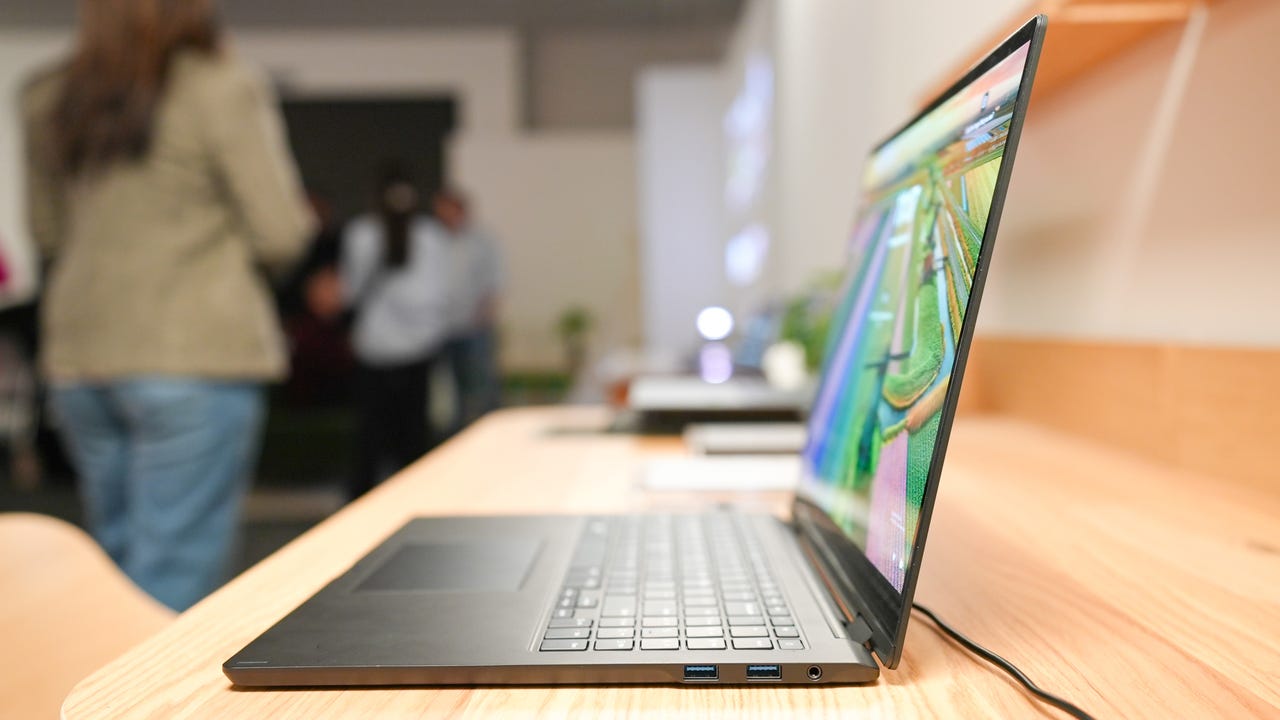
LG’s newest Gram laptop are so ultraportable that one of them even has a Guinness World Record to its name. “It’s the world’s lightest 16-inch 2-in-1 laptop,” a representative touts during an intimate afternoon at the company’s facility, where LG demoed several of its CES-announced products as release dates near.
Also: M3 MacBook Air review: Apple’s AI computer for the masses has arrived
I spent a good hour and a half moving from station to station, from 240Hz ultrawide monitors to the company’s upcoming CineBeam Q Projector. ZDNET’s Kyle Kucharski will share his early impressions on that classy lunchbox of a projector soon, while I’ll break down below the key reasons why the LG Gram Pro may secretly be the ultraportable laptop most professionals should buy in 2024, not Apple’s new M3 MacBook Air.
1. The numbers don’t lie
LG Gram Pro 16 2-in-1 (left) and the 15-inch Apple MacBook Air (right).
Kerry Wan/ZDNET
When you whip out the scale to demo the lightness of a laptop, you best believe that a room of journalists will have other competing devices in hand to test the numbers. Going into the evaluation, I had just swapped my 13-inch M3 MacBook Air with my colleague Jason Hiner’s 15-inch model, so the timing couldn’t have worked out better.
There I was, with two relatively large-sized, ultraportable laptops and a digital scale to determine exactly which one would strain my back a little less. Traveling all the time with a backpack full of camera gear and other electronic trinkets probably isn’t the best habit for my physical health, so every ounce that I can remove matters.
Also: M3 MacBook Air vs. M2 MacBook Air: Which Apple laptop should you buy?
The LG Gram Pro 16 2-in-1 had already set the mark at 3.04 pounds. Then came the 15-inch MacBook Air, clocking in at 3.51 pounds. A slight sigh of relief could be felt behind me. How exactly does LG achieve this? They’re chalking it up to the nano-magnesium alloy construction, which feels more plasticky than the MacBook’s all-aluminum but is noticeably lighter in the hand, especially when I moved the laptops around for pictures.
2. It’s all about the use of space
The curvatures of the LG Gram Pro edges also mean that the company can fit more ports on both the left and right sides than the MacBook Air. We’re talking two USB-C ports and a 3.5mm headphone jack on the Air versus two USB-C ports, a 3.5mm headphone jack, two USB-A ports, and an HDMI on the Gram.
Also: Microsoft confirms next Windows, Surface, and AI event. Here’s what to expect
As someone who still relies on legacy devices, such as hard drives, that have USB-A ports, the presence of the standard and added flexibility of the Gram makes it a better productivity laptop for me. It also helps to have the HDMI slot for when you’re traveling and want to connect to a hotel TV or monitor.
3. OLED makes all the difference
Don’t get me wrong, the Liquid Retina (IPS) display on the 15-inch MacBook Air is plenty reliable to get work done and immerse in for entertainment. But just like how I can’t go back to smartphones, tablets, and TVs with LCD displays after switching to OLED, the same idea applies to these laptops.
Also: OLED vs. QLED: Which is better for you?
LG offers the new Gram Pro laptops in IPS and OLED variants, but the latter that I tested at the venue were noticeably sharper and more color-accurate. It helped that LG had set black wallpapers on the demo units, which made the individual icons and self-emissive pixels pop a little more.
ZDNET’s buying advice
If I had to nitpick, I just wish LG treated the new Gram Pro models with brighter matte displays. Considering these laptops are meant to be carried around and used in various locations (including outdoors), the anti-reflective nature of the satin finish and added nits would make a practical difference.
LG prices its OLED Gram Pro laptops at a starting rate of $1,799. That includes 16GB of RAM (or 32GB when you preorder the laptop) and 1TB of storage and manages to undercut a 15-inch MacBook Air with similar configurations by $100. We’ll have to do more in-depth testing of the laptops before giving them a final verdict, but based on early impressions, LG’s Gram Pro line looks more promising than ever.
Featured reviews



